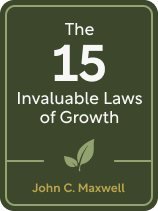

This article is an excerpt from the Shortform book guide to "The 15 Invaluable Laws of Growth" by John C. Maxwell. Shortform has the world's best summaries and analyses of books you should be reading.
Like this article? Sign up for a free trial here.
Do you want to grow personally? How committed are you?
If you want to live meaningfully and realize your potential, you have to pursue personal growth. One of the first steps is to commit to growth. John C. Maxwell explains why commitment is necessary and why you shouldn’t put commitment off. He offers a few ways you can embark on intentional growth today.
Continue reading to learn the importance of commitment and three ways you can move in that direction.
Commit to Growth
Once you’ve developed the foundational mindset needed to pursue personal growth, Maxwell says it’s time to take the next step: commit to growth. In the context of personal growth, commitment means setting an intention to reach your potential—and, crucially, following through on that intention by making the changes and seeking out the opportunities that will get you there.
(Shortform note: If you don’t feel ready to commit to personal growth, that’s okay—but don’t let that feeling hold you back from getting started. It’s normal to hesitate before undertaking growth-related challenges, but the only way to reap the rewards of growth is to push through discomfort and take action anyway. It may help to keep in mind that when it comes to personal growth, you’re aiming for improvement, not perfection. You don’t need perfect character or complete self-knowledge and self-worth to commit to growth—you just need an intention to get better and a willingness to follow through on it.)
Why Making a Commitment Helps You Grow
Maxwell argues that making a commitment is necessary because growth can happen only intentionally—not accidentally. Many people make the mistake of expecting to grow automatically throughout their lives. Because of this, they never intentionally improve themselves; then, they wind up dissatisfied with how their lives turn out.
(Shortform note: Although Maxwell argues here that you can grow only intentionally, he has said elsewhere that accidental growth can happen—it’s just not as effective as purposeful growth. In any case, his position is that intentionality helps you achieve more than you would otherwise.)
How to Make a Commitment to Grow
Maxwell doesn’t just encourage commitment—he encourages starting intentional growth today because the longer you procrastinate, the less likely you are to do it. Here’s how you can cement your commitment and avoid procrastination.
(Shortform note: Maxwell argues against procrastination due to the way it can make you lose your motivation to follow through on growth. However, there’s another reason not to procrastinate on making commitments: It can lead to a loss of opportunities. You won’t be able to take advantage of the opportunities to grow that are available to you right now, and they may not be available to you in the future. In Predictably Irrational, Dan Ariely recommends evaluating how time-sensitive your opportunities are and immediately pursuing any that are likely to disappear in the near future.)
Method #1: Evaluate Your Excuses
If you don’t feel ready to commit to growth, a good place to start is to evaluate your excuses. You might be able to think up some reasons for putting off growth, like fear of failure, not knowing how to get started, lack of time, or lack of motivation. But according to Maxwell, none of these are valid excuses—the benefits of personal growth outweigh whatever reasons you might have for putting it off. Don’t let your excuses hold you back; instead, find a way to overcome them.
For example, say that you’re worried you don’t have enough time to exercise. If you evaluate this excuse, you might realize that you spend a lot of time on non-essential activities like watching TV. In that case, your excuse wouldn’t hold up—you have plenty of free time; you just have to start spending it more wisely.
(Shortform note: Maxwell claims that no excuse should stop you from pursuing growth—but there are situations where you may have valid reasons for putting off growth. If you’re “in survival mode”—focused on merely surviving from one day to the next—you’re not going to have the time, energy, or resources to start pursuing your bigger dreams. For example, if you’re exhausted because you’re caring for an aging parent, it’s probably not wise to add anything extra to your plate. However, you can still recognize your desire to grow and make a commitment to honor that intention when the right time comes along.)
Method #2: Schedule Time to Grow
Once you have an intention in mind, you must set it in stone and give yourself time to follow through on it. That’s why Maxwell suggests assigning time in your schedule every day, for at least a year, that you’ll devote to pursuing your personal growth-related goals. For example, you might schedule time to practice the piano every evening after dinner.
(Shortform note: One benefit of scheduling personal growth is that it can help you manage your time more wisely—ensuring that you prioritize the right things in your daily agenda. If you fill your schedule with activities you really care about—in this case, growth-oriented activities—you won’t have as much time for, or waste as much time on, the things you don’t care about.)
Method #3: Make Your First Move
Today, find a way to make immediate progress toward achieving one of your goals. For example, if you’ve made learning piano one of your goals, write down, right now, a time you plan to practice today—or even sit down and practice for 15 minutes. Taking immediate action toward your goals will affirm your commitment to growth and help you avoid procrastination.
(Shortform note: Maxwell’s suggestion to take a tiny, immediate step forward is meant to make growth seem more easily doable. In One Small Step Can Change Your Life, Robert Maurer explains that breaking large goals down into small, achievable steps helps you avoid feeling overwhelmed by the amount of time and effort changes take, which is one of the main drivers of procrastination. Additionally, as you easily overcome these small steps, your successes will motivate you to keep going.)

———End of Preview———
Like what you just read? Read the rest of the world's best book summary and analysis of John C. Maxwell's "The 15 Invaluable Laws of Growth" at Shortform.
Here's what you'll find in our full The 15 Invaluable Laws of Growth summary:
- Why personal growth is essential to living a meaningful life
- How to build strong character and live with integrity
- How to envision, commit to, and pursue meaningful goals







As a business owner, developing goals for yourself and your business will be easier when you create them in the context of a commitment. Instead of defining your success according to money, which as we know can be fickle, defining it based on a larger purpose will help you stay afloat in difficult times, and redirect accordingly.